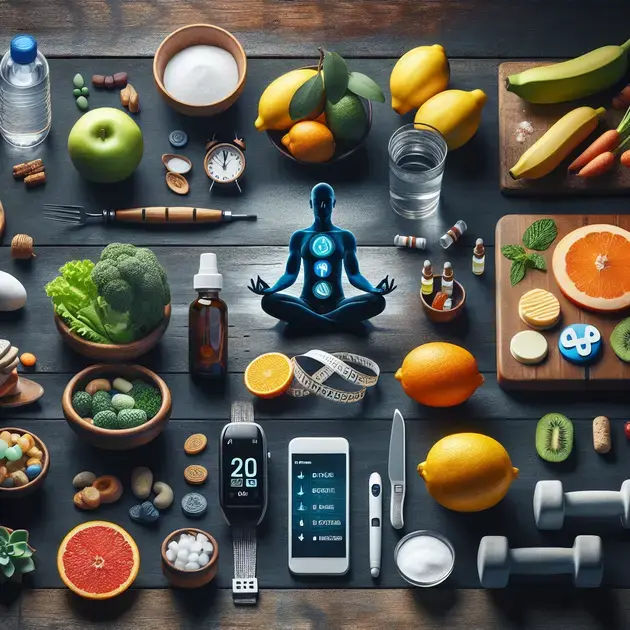Lower Your Blood Glucose Levels Naturally
Lowering your blood glucose levels naturally is a topic of great interest in today’s health and wellness discussions. With the increasing prevalence of diabetes and the importance of maintaining healthy blood sugar levels, many individuals are seeking out natural remedies and lifestyle changes to support their overall well-being.
There are various ways to lower blood glucose levels without relying solely on medication. From incorporating more physical activity into your routine to making dietary adjustments such as reducing sugar intake and increasing fiber-rich foods, these natural approaches can have a positive impact on managing blood sugar levels and improving overall health.

Effective Strategies for Lowering Blood Glucose Naturally
Lowering blood glucose levels naturally is essential for managing diabetes and overall health. One effective strategy is to focus on a low-carbohydrate and high-fiber diet. Apps like MyFitnessPal and Lose It! can help you track your daily intake of carbohydrates and fiber, making it easier to make informed food choices.
Incorporating regular physical activity into your routine is another key strategy. Apps like Fitbit and Strava can help you track your exercise, set goals, and monitor your progress. Aim for at least 150 minutes of moderate-intensity aerobic activity per week, such as brisk walking or cycling.
Stress management is also crucial for maintaining healthy blood glucose levels. Apps like Headspace and Calm offer guided meditation and relaxation techniques to help reduce stress and improve overall well-being. Prioritize self-care practices such as deep breathing exercises and mindfulness.
Getting an adequate amount of quality sleep is another important strategy. Apps like Sleep Cycle and Calm can help you track your sleep patterns and optimize your bedtime routine for better sleep quality. Aim for 7-9 hours of restful sleep each night to support proper blood glucose regulation.
Regular monitoring of your blood glucose levels is key to understanding how your lifestyle choices are impacting your health. Use a glucose monitoring app like mySugr or Glucose Buddy to track your levels, identify patterns, and make necessary adjustments to your daily routine.
The Power of Physical Activity in Managing Blood Sugar
Physical activity plays a crucial role in managing blood sugar levels and overall health. One effective strategy is to engage in a combination of aerobic exercise and strength training. Apps like Nike Training Club and Fitness Blender offer a variety of workout routines that cater to different fitness levels and goals.
Setting specific and achievable exercise goals is essential for staying motivated and consistent. Apps like Strava and MapMyRun allow you to track your workouts, set goals, and join challenges to keep you accountable and motivated. Aim to incorporate at least 30 minutes of physical activity into your daily routine.
Monitoring and adjusting your exercise routine based on your blood sugar levels is key to optimizing your physical activity. Use a fitness tracker like Fitbit or Apple Watch to monitor your heart rate, calories burned, and activity levels. Regularly check your blood sugar levels before and after exercise to understand how your body responds to different types of physical activity.
Hydration is important for supporting optimal exercise performance and blood sugar regulation. Apps like WaterMinder and Hydro Coach can help you track your daily water intake and set reminders to stay hydrated throughout the day. Aim to drink at least 8-10 glasses of water daily, especially before, during, and after exercise sessions.
Incorporating flexibility and balance exercises into your routine can help improve your overall physical fitness and reduce the risk of injuries. Apps like Yoga Studio and Daily Yoga offer guided yoga sessions and stretching routines to enhance flexibility, mobility, and balance. Aim to include these exercises 2-3 times per week in your workout regimen.
Nutritional Changes to Support Healthy Blood Glucose Levels
Making nutritional changes to support healthy blood glucose levels is essential for managing diabetes and promoting overall well-being. One effective strategy is to focus on a balanced diet rich in whole foods, such as fruits, vegetables, lean proteins, and whole grains. Apps like MyPlate and Fooducate can help you track your daily food intake and provide nutritional information to guide your food choices.
Limiting the intake of high-sugar and processed foods is crucial for stabilizing blood sugar levels. Apps like Sugar Sense and CarbsControl can help you identify hidden sugars in packaged foods and track your daily sugar consumption. Aim to minimize the consumption of sugary beverages, desserts, and processed snacks.
Incorporating healthy fats, such as avocados, nuts, and olive oil, into your diet can help improve insulin sensitivity and blood sugar control. Apps like FatSecret and MyNetDiary can help you track your fat intake and ensure you are consuming a balanced mix of fats in your meals. Aim to include sources of healthy fats in your daily meals, such as adding avocado to salads or using olive oil for cooking.
Monitoring your carbohydrate intake and focusing on low-glycemic foods can help prevent spikes in blood sugar levels. Apps like Carbs & Cals and MyNetDiary offer carbohydrate tracking features and glycemic index information to help you make informed food choices. Aim to include complex carbohydrates, such as whole grains, legumes, and vegetables, in your meals to support steady blood sugar levels.
Practicing mindful eating and listening to your body’s hunger and fullness cues can help you avoid overeating and maintain a healthy weight. Apps like Rise Up and Noom provide behavioral coaching and support to help you develop mindful eating habits. Aim to eat slowly, savoring each bite, and stop when you feel satisfied, rather than full.

Managing Stress for Better Blood Glucose Regulation
Managing stress is crucial for better blood glucose regulation in individuals with diabetes. Stress triggers the release of hormones like cortisol and adrenaline, which can cause blood sugar levels to spike. Finding effective ways to reduce and cope with stress can significantly impact blood glucose control.
One approach to managing stress is through regular physical activity. Exercise has been shown to reduce stress levels and improve blood sugar management. Activities like yoga, walking, or meditation can help lower stress hormones and promote better blood glucose regulation.
In addition to exercise, incorporating relaxation techniques into your daily routine can also be beneficial. Practices such as deep breathing exercises, progressive muscle relaxation, and mindfulness meditation can help lower stress levels and promote a sense of calm, leading to improved blood glucose control.
Another important aspect of managing stress is ensuring you have a strong support system. Talking to friends, family, or a therapist about your stressors can help you process and cope with challenging situations, ultimately leading to better blood sugar regulation.
It is essential to prioritize stress management as part of your overall diabetes care plan. By actively working to reduce stress levels through exercise, relaxation techniques, and seeking support, you can significantly improve your blood glucose control and overall well-being.
The Role of Sleep in Balancing Blood Sugar Levels
Sleep plays a vital role in balancing blood sugar levels and overall health. Lack of quality sleep can disrupt the body’s hormonal balance, leading to insulin resistance and elevated blood sugar levels. Establishing healthy sleep habits is essential for individuals looking to optimize their blood glucose control.
One way to improve sleep quality is by maintaining a consistent sleep schedule. Going to bed and waking up at the same time every day can help regulate your body’s internal clock, promoting better sleep patterns and ultimately contributing to improved blood sugar regulation.
Creating a relaxing bedtime routine can also aid in achieving restful sleep. Activities like reading, taking a warm bath, or practicing relaxation techniques before bed can signal to your body that it’s time to wind down and prepare for sleep, helping to balance blood sugar levels.
Ensuring your sleep environment is conducive to rest is another important factor in promoting quality sleep. Keeping your bedroom cool, dark, and quiet can help optimize your sleep environment, allowing you to get the restorative sleep needed for better blood glucose control.
Prioritizing sleep as an essential component of your diabetes management plan is crucial. By adopting healthy sleep habits, creating a relaxing bedtime routine, and optimizing your sleep environment, you can improve your overall sleep quality and better regulate your blood sugar levels.
Holistic Approaches to Improving Blood Glucose Control
Adopting a holistic approach to improving blood glucose control involves addressing various aspects of health and well-being to optimize diabetes management. By focusing on lifestyle factors beyond diet and medication, individuals can enhance their blood sugar regulation and overall quality of life.
One holistic approach to improving blood glucose control is through stress management techniques. As previously discussed, managing stress through exercise, relaxation practices, and seeking support can significantly impact blood sugar levels and promote better overall health.
Another aspect of a holistic approach is incorporating a nutrient-dense diet rich in whole foods. Consuming a variety of fruits, vegetables, whole grains, and lean proteins can help stabilize blood sugar levels and provide essential nutrients for optimal health and diabetes management.
Regular physical activity is also key to holistic blood glucose control. Exercise not only helps lower stress levels but also improves insulin sensitivity, allowing for better utilization of glucose in the body. Finding activities you enjoy and incorporating them into your routine can positively impact blood sugar regulation.
Additionally, incorporating relaxation practices like deep breathing exercises, mindfulness meditation, or yoga into your daily routine can help reduce stress levels and promote a sense of calm, leading to improved blood glucose control.
By adopting a holistic approach that encompasses stress management, nutrition, physical activity, and relaxation practices, individuals can enhance their blood glucose control and overall well-being, ultimately leading to better diabetes management outcomes.
Conclusion
In conclusion, managing stress through techniques like regular physical activity, relaxation practices, and seeking support is crucial for better blood glucose regulation in individuals with diabetes. By incorporating exercise, relaxation techniques, and building a strong support system, one can significantly impact blood glucose control and overall well-being.
Furthermore, prioritizing healthy sleep habits, such as maintaining a consistent sleep schedule, creating a relaxing bedtime routine, and optimizing the sleep environment, plays a vital role in balancing blood sugar levels. Quality sleep is essential for optimizing blood glucose control and overall health in individuals looking to improve their diabetes management.
Adopting a holistic approach that includes stress management, nutrition, physical activity, and relaxation practices is key to enhancing blood glucose control and overall quality of life. By addressing various aspects of health and well-being beyond diet and medication, individuals can achieve better diabetes management outcomes and improve their overall well-being.